Unit6TheTelephone教(学)案(综英二)
人教版新目标英语九年级Unit6 单元话题写作教学案

九年级Unit 6 When was it invented ?写作教学案(教师使用)【话题】发明(Inventions)【写作目标】本单元围绕“发明”这一话题,通过讨论一些重要发明的历程及用途来掌握和运用一般过去时态的被动语态。
【课前任务】一、写出下列短语。
1、有道理2、偶然3、毫无疑问4、无意中5、例如6、不同种类的7、由……制成参考答案:1. have a point 2. by accident 3. without doubt 4. by mistake5. such as 6.different kinds of 7. be made of/from二、根据汉语意思完成下列句子。
1、电话是什么时候发明的? 在19世纪70年代。
. When ________ the telephone ________ ? ________ ________.2、据说有一位叫神农的中国统治者最早发明了茶可以饮用。
It is said that a Chinese ruler called Shen Nong ________ ________ ________ ________ discover tea asa drink.3、人们认为,茶在六至七世纪传到了韩国和日本。
It is believed that tea ________ ________ to Korea and Japan during the 6th and 7th centuries.4、中国与西方国家间的茶贸易发生在19世纪。
The tea trade from China to Western countries ________ ________ in the 19th century.5、篮球不但变成了一种可以玩的流行的体育运动,而且也变成了一种流行的可以观看的体育运动。
Basketball has ________ ________ become a popular sport to play, but it has ________ become a popular sport to watch.参考答案:1.was, invented, In 1870s 2.was the first to3.was brought 4.took place 5.not only, also.三、写出与本话题有关的词汇和句型。
unit 6The telephone(精读第二版) 答案
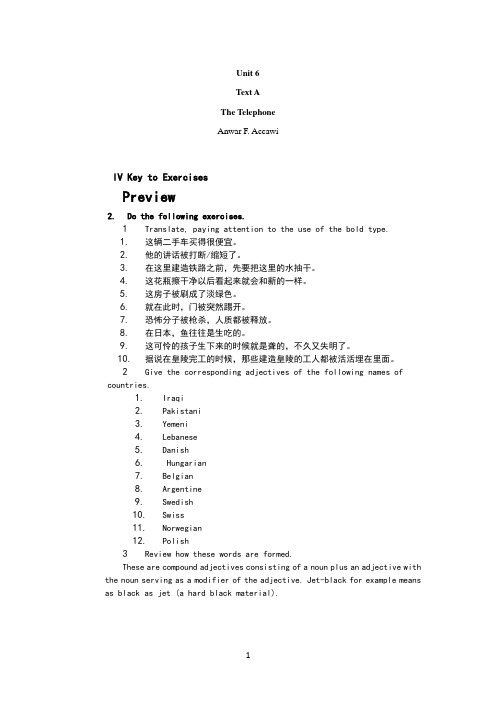
Unit 6Text AThe TelephoneAnwar F. AccawiIV Key to ExercisesPreview2.Do the following exercises.1Translate, paying attention to the use of the bold type.1.这辆二手车买得很便宜。
2.他的讲话被打断/缩短了。
3.在这里建造铁路之前,先要把这里的水抽干。
4.这花瓶擦干净以后看起来就会和新的一样。
5.这房子被刷成了淡绿色。
6.就在此时,门被突然踢开。
7.恐怖分子被枪杀,人质都被释放。
8.在日本,鱼往往是生吃的。
9.这可怜的孩子生下来的时候就是聋的,不久又失明了。
10.据说在皇陵完工的时候,那些建造皇陵的工人都被活活埋在里面。
2Give the corresponding adjectives of the following names of countries.1.Iraqi2.Pakistani3.Yemeni4.Lebanese5.Danish6. Hungarian7.Belgian8.Argentine9.Swedish10.Swiss11.Norwegian12.Polish3Review how these words are formed.These are compound adjectives consisting of a noun plus an adjective with the noun serving as a modifier of the adjective. Jet-black for example means as black as jet (a hard black material).4 Point out the word or phrase that doesn’t belong in each line.1.crush2.crack3.crunch4.valueless5.click6.enthroned7.breezemitment9.career10.obliterate5 Complete the verb phrases by putting in prepositions or adverbs listed below.1.for2.up3.for4.for5.for6.for7.down/u p8.up9.into/i n/down/up10.up11.up12.for13.up14.in15.into16.into17.up18.up19.up20.in21.up22.for23.up24.into25.in26.for/up27.up28.up29.up30.in31.for32.in33.in34.up35.down/up36.into37.for38.into39.for40.into41.into42.for43.down/up44.up45.up46.down/up47.for48.in49.up50.up51.forVocabulary1.Translate the following expressions. Into English1.to crack the walls2.to save souls3.to play hide-and-seek4.to slow to a trickle5.to grab sb by the hair6.to call sb names7.to rip her shirt8.to reveal the secret9.to resist progress10.to come into view11.to gather firewood12.to talk sb out of doing sth13.to wriggle one’s way out of14.to run errands15.to deliver sb from suffering16.to assure a steady supply17.to take the pressure off sb18.to keep him out of one’s hairInto Chinese1.梯田2.多岩石的山脉3.百日咳4.周围的村庄5.林中的一块空地6.细粉尘7.羊粪8.粘乎乎的双手9.强壮有力的的妇女10.旌旗如林11.第一手的资料12.漆黑的头发13.一位虔诚的天主教徒14.家务事15.一种让人感到在家般自在的声音16.手卷香烟17.有利可图/十分挣钱的生意18.一家肉铺19.它往日风采的空架子20.一所教会学校2. Replace the parts in bold type with appropriate words and expressions from the text.1.gave way: caved inburied:trapped2.asked for: chargedprofitable: lucrative3.persuade him not to: talk him out of itobstruct: resist4. a quarrel: a argumentdeveloping: escalating5.sent to: relayed to / delivered togather: assemble/congregateshow their strong disagreement with: protest against6.become all skin and bones: been reduced to mere skeletonsrescue: save/deliver7.started to: began to/proceeded tovery seriously and carefully: with utmost gravity8.destroyed: ruined/devastated/wreckedtore: cracked/split9.prevent unwanted visitors from bothering you:keepunwanted visitors off your hair10.heavily crowded: packed with peoplesqueeze: wriggle3.Translate the following sentences into English.1.Incredible as it may sound, I hear that they charge 40 yuan fora bowl of simple noodles.2.Sun Quan finally talked everybody into agreeing to put Lu Xun,a young scholar, in charge of (commanding) this decisive battle.3.He was arrested on the charge of (charged with) smuggling, butin accordance with the law, no citizen can be arrested without evidence.4.She dropped the plate on the ground, but it miraculously didnot break, landing without so much as a crack. OR …not break. It didn’t have so much as a crack5.I can assure you that if we dig a well deep enough here, we willstrike water. So if you guys have no objection, let’s getstarted/proceed.6.She takes delight in shifting the tables and chairs in this roomso as to give the room a new look.7.The focus of our economic development has shifted from thecoastal areas in the east to the central and western areas.8.He shifted/changed to the highest gear, thus leaving all theother cars far behind.9.I maintained that smoking should be forbidden, but he disagreedbecause he said that the tobacco industry was an important source ofgovernment revenue.10.The local people raised a strong objection to installing thecable car over that beautiful mountain.4.Choose the right words in their proper forms.11. assure2.assured3.reassuring4.insured; ensured5.ensure; reassured6.reassuringly21.twisted/turned2.twisted3.wring4.distorted/twisted5.twisted6.twisted7.wringing3 1. gathered/assembled2. assembling3. gather; gathered OR collect; collected4. gathering; assembled/gathered; collectors5. collect/gather6. collect; collecting; collection4 1. crack; break2. cracked; tear3. tore4. split; broke5. break; Split6. tore/ripped7. torn51. abandoned2. abandoned/deserted/forsaken; abandoned3. abandon/desert/forsake4. desert5. forsaken; deserted6. abandoned61. ignore2. neglect3. overlook4. neglected5. ignore6. neglecting5. Point out which of the following sentences contain paradox and which oxymoron.1.paradox2.paradox3.oxymoron4.oxymoron5.oxymorons6.paradox7.paradox8.paradox 9.oxymoron10.paradox11.paradox12.paradox13.paradox14.paradox15.oxymoron16.paradoxGrammar1.Learn to use as and though as concessive conjunction.1Group the patterns of concessive clauses in the following sentences into the categories listed below.1, 2, 3, 6; 4, 9; 5, 8; 7, 102Complete the sentences by translating the Chinese in brackets using the patterns of concessive clauses listed in the previous exercise.1.Simple as it is2.Much as he loves his children3.Try as he might4.Trash as it really is5.Happy and contented as they are in retirement6.Hard taskmaster though he appeared to be in the lab7.Tempting though it was8.Perfect talk show host though he is9.Much as I respect him10.Proud as they are of their father2.Learn to use “It is/was (high) time that sb did sth”.1Decide on the precise meaning of the structure.Note:The structure “it is/was (high) time (that)…” is used to convey two meanings. One is “approximately the right time”, the other being “past the appropriate time” For example, It’s time you went to bed can mean either that “You should have gone to bed much earlier” (often stated with emphasis on the word time), or that now is the appropriate time for you to go to bed. The precise meaning of this term depends on the tone of voice and/or the context.1,3, 6, 7, 2, 4, 5, 8。
人教版英语九年级全一册教案:Unit6 SectionA(1a-2d)
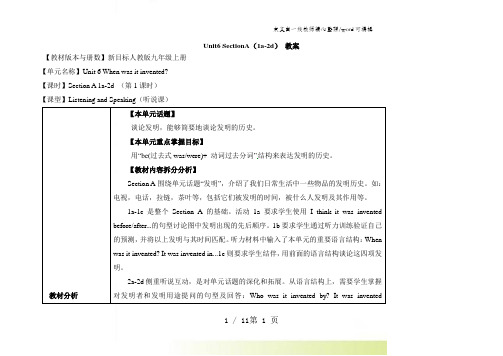
Unit6 SectionA(1a-2d)教案【教材版本与册数】新目标人教版九年级上册【单元名称】Unit 6 When was it invented?【课时】Section A 1a-2d (第1课时)【课型】Listening and Speaking(听说课)教材分析【本单元话题】谈论发明,能够简要地谈论发明的历史。
【本单元重点掌握目标】用“be(过去式was/were)+ 动词过去分词”结构来表达发明的历史。
【教材内容拆分分析】Section A围绕单元话题“发明”,介绍了我们日常生活中一些物品的发明历史。
如:电视,电话,拉链,茶叶等,包括它们被发明的时间,被什么人发明及其作用等。
1a-1c是整个Section A的基础。
活动1a要求学生使用I think it was invented before/after...的句型讨论图中发明出现的先后顺序。
1b要求学生通过听力训练验证自己的预测,并将以上发明与其时间匹配。
听力材料中输入了本单元的重要语言结构:When was it invented? It was invented in...1c则要求学生结伴,用前面的语言结构谈论这四项发明。
2a-2d侧重听说互动,是对单元话题的深化和拓展。
从语言结构上,需要学生掌握对发明者和发明用途提问的句型及回答:Who was it invented by? It was invented1 / 11第 1 页by...What was/is it used for...? It was/is used for...从活动和内容上看,2a要求学生听对话谈论三项发明,并按所听顺序为其排序;2b需要学生听懂发明的用途,补全表格。
2c 要求学生结伴谈论听力中的发明用途。
2d作为示范性对话,介绍了生活中随处可见的小发明-拉链。
【通过本单元的学习学生需掌握哪些综合技能】通过本单元的学习使学生学会谈论各种发明的历史,熟练使用被动语态。
实用综合教程(第二版)1-Unit_6__课后解答

Text A / ComprehensionA. Choose the best answer according to the text.Key: 1.A 2. B 3. C 4. A 5. BB. Complete the following sentences orally with your partner.1.Key: it was already a heavy burden for his parents to support him2.Key: check the candidates’ references3.Key: the time slot was ideal; the restaurant wasn’t very far from his college4.Key: Sir, I will do my best. I’m from the countryside and I’m good at hard work. And I can work two days for free as a trial5.Key: excited and thankful.C. Make a dialogue with your partner according to the situation described below.W: Hello…B: You are too late.W: But sir, I’ll do my best. I’m from the countryside and I’m good at hard work. And I can work two days for free as a trial .B: I want a boy who not only works hard but also keeps clean . Remember it is a restaurant. But look at your hands and clothes !W: Yes, I’m not very clean now. But you know, I have been hunti ng for a job for a whole day . B: Really? It is difficult to look for jobs nowadays.W: Oh, sir, I’ll keep myself clean and tidy . I promise I will work very hard, sir, if only you could give me this chance .B: All right, all right, I’ll give you a tr y .W: Thank you, sir!B: Leave me your telephone number and references . I need to have more personal information about you.W: Oh, no problem. Here is my resume .B: That’s good. Let’s see. You may come to work here the day after tomorrow .W: All right! I will be here on time .B: OK, you can go now.W: Thanks again. See you the day after tomorrow .Vocabulary Building / ExercisesA.Match each word with their proper Chinese meaning.B.Fill in each blank with a given word or expression in their rightform.1. The train would pull out soon. We ran like mad to catch it.2. My old grandmother has / had difficulty in remembering things.3. The company employs / employed / has employed about 100 men.4. She checked the letter before sending it.5. We are not prepared to accept the big change in the plan.6. It’s too late to go to the basketball match now;besides , it’s beginning torain.7. We’ve been hunting for the lost boy all over the town.8. It’s a good habit to go for a walk after supper.Grammar Tips / ExercisesA. Complete each sentence with the given verb in its indefinite tense.1. Tom plays (play) football with his friends after school.2. They read (read) stories every night before going to bed.3. The classroom has (have) eight big windows.4. Did you visit (visit) your relatives last Spring Festival?5. —Did he fly (fly) a kite on Sunday? — Yes, he did .6. We went (go) strawberry picking in the spring break.7. You will feel (feel) cold without an overcoat.8. Her father is going to buy (buy) her a dress for her birthday.9. You are to finish (finish) all the work by the end of today.10. I will give (give) it to you as soon as he comes back.B. Choose the best answer.1. Where does your pen pal live?A. No, she live in the country.B. She live in the city.C. She lives in the city.D. She isn’t live near.2. When does she go to work?A. She go to work at 7.B. She goes to work at 7.C. Yes, she does.D. She is goes at 7.3. Does Peter go to school by subway?A. No, he does.B. No, he doesn’t.C. Yes, on foot.D. Yes, he is.4. — Your city looks beautiful!— Yes. Lots of trees and grass ________ last year.A. are plantedB. have plantedC. were plantingD. were planted5. The PLA ________ in 1927.A. was foundB. foundC. was foundedD. founded6. — Did you win the basketball game?— Bad luck. Our team ________ in the final round.A. wonB. beatC. were wonD. were beaten7. — What did you do last Saturday?— I ________ my uncle.A. visitB. will visitC. visitedD. am visiting8. —Let’s go out to play football, shall we?— OK. I ________.A. will comingB. be going to comeC. comeD. am coming9. It ________ us a long time to learn English well.A. takesB. costsC. spendsD. will spend10. The train ________ at 11.A. going to arriveB. will be arriveC. is going toD. is arrivingC. Complete the sentences according to the Chinese.1. 父亲和孩子们每周日下午都去游泳。
人教版八年级英语上册精品教学课件 Unit 6 Section B (2a-2e)

6. Why do you think resolutions may be difficult to keep? _S_o_m__e_ti_m__e_s _th__ey__m__a_y_b_e__d_if_f_ic_u_l_t_t_o_k_e_e_p__o_r_____ _s_o_m__et_i_m_e_s_p__eo_p__le__ju_s_t_f_o_r_g_e_t_a_b_o_u_t_t_h_e_m__. ______
2b correct places.
A. These are about making yourself a better person. B. For example, a student may have to find more time
to study. C. There are good reasons for this. D. The start of the year is often a time for making
第一段:It’s a kind of promise. However, promises you make to yourself are resolutions.
第二段:different kinds of resolutions; some…; some resolutions…
第三段:hardly ever keep them. … the best resolution is to have no resolutions!
1) 此处情态动词may表示推测,相当于汉语的“可能; 或许;大概”之意。
e.g. You may be right this time, but I’m not sure. 这一次你或许是对的,但我无法确定。
Unit6SectionA(1a-2d)课件2021-2022学年人教版九年级英语

Alice: Haha! How about _c_a_rs_? They weren’t invented yet, were they?
Grandma: Yes, they were. Cars were invented in _1_8_8_5_. My family had a car.
Alice: Well, did you have a _T_V__? Grandma: No, we couldn’t _a_ff_o_r_d_ one. They were
seeing _in__t_h_e_d_a_r_k__
hot ice-cream scoop _s_e_r_v_i_n_g_ really cold ice-cream
原文:
Alex: Hi, Carol. Wow, what are those? Carol: Hello, Alex. Oh, these are some of the
Section A 1a-2d 人教新目标版 九年级上
Do you know what these inventions are?
Do you know who these inventors are? Karl Benz Alexander Bell J. L. Baird
Can you match the inventions with the right inventors?
人教版九年级英语Unit 6 教案

Unit 6 When was it invented?单元话题In this unit, students learn to talk about the history of inventions.单元语法Passive voice (past tense)教学目标1.能掌握以下句型:①—When was the telephone invented?—I think it was invented in 1876.②—What are they used for?—They are used for seeing at night.2.能谈论物品被发明的时间、发明者,表达某发明的用途。
3.了解一些近现代发明的时间及用途,激发自己热爱发明的情感。
培养学生善于观察事物,面对难题,用积极的态度去解决,发挥想象力,认识世界,改造世界,拥有强烈求知欲的素养。
学情分析本单元话题是发明,学生们对发明不太熟悉,因此教师在讲前应普及下有关发明的知识。
在畅谈发明话题时自觉运用被动语态的过去时态。
第一课时Section A(1a~2d)教学设计知识目标重点单词1.style n.样式,款式2.pleasure n.高兴,愉快3.daily adj. 日常的,每日的4.mention v. 提到,说到5.list v.列表,列清单n.名单,清单重点词组1.shoes with special heels特殊后跟的鞋子2.hot icecream scoop 热的冰淇淋勺子3.run on electricity 电动的4.be used for被用作5.such a great invention 如此了不起的发明6.our daily lives我们的日常生活7.have a point有点道理8.with pleasure 愿意效力重点句式1.I think the TV was invented before the car.我认为电视是在轿车之前发明的。
综合教程6第二版答案(精选3篇)

综合教程6第二版答案(精选3篇)以下是网友分享的关于综合教程6第二版答案的资料3篇,希望对您有所帮助,就爱阅读感谢您的支持。
篇一:新世纪综合教程四第二版Unit 六答案Keys-Unit 6VocabularyI. 1.important event2. refill their hearts and minds with their cultural traditions3. the American beliefs, values and loyalties4. true demonstration of what happened5. brief experience or idea6. live in the way ofII. 1. took pride in 2. was immersed in 3. resonating with 4.had… been exposed to 5. in his mind’s eye 6. a glimpse of 7. convey… to 8. turned… toIII. 1. fluency 2. enrollment 3. accessible 4. obtainable 5. personification 6. enlightenment 7. globalization 8. promptly IV. C, B, A, C, C, D, D, CV. 1. education instruction, illumination 2. available, attainable, accessible 3. tale, story 4. harmless, auspicious 5. begin, start, commence 6. tackle, face, handle7. comfort, relaxation, ease 8. immigrateVI. 1. literature 2. joined 3. motionless 4. more than5. quickly6. hasGrammarI. 1. why 2. where 3. when 4. where5. where6. where7. why8. whenII. 1. Sam knows where we are meeting.2. /3. Four o’clock in the afternoon is the time he always reads. /Four in the afternoon is when he always reads.4. /5. I don’t know the exact time I should meet him.6. The reason he resigned is still unknown.7. I remember the morning he first came to school.8. I’ll never forget the day we first met.III. more formal→ less formal: 2, 3, 1; 4, 6, 5.IV. 1. When Mrs. Brown arrived home, she found that her flat had been robbed and all her silver had been taken. Enquires were made by the police to find out possible clues. The burglar hasn’t been caught yet but he is expected to be arrested before long.2. After a hideout for terrorists had been discovered yesterday a raid was carried out by the police and five terrorists were arrested. The police said more terrorists are expected to be arrested in the next few days.V. 1. shall 2. should 3. shall 4 would5. would6. will7. shall8. willTranslationI. 1. 虽然我没见过有人抬头看它一眼, 但打心眼里希望来自美国的旅游者能看到它并会心一笑,或者路过此地的法国人能想到悬挂它的日期和理由。
人教版新目标九年级英语Unit6单元集体备课教案
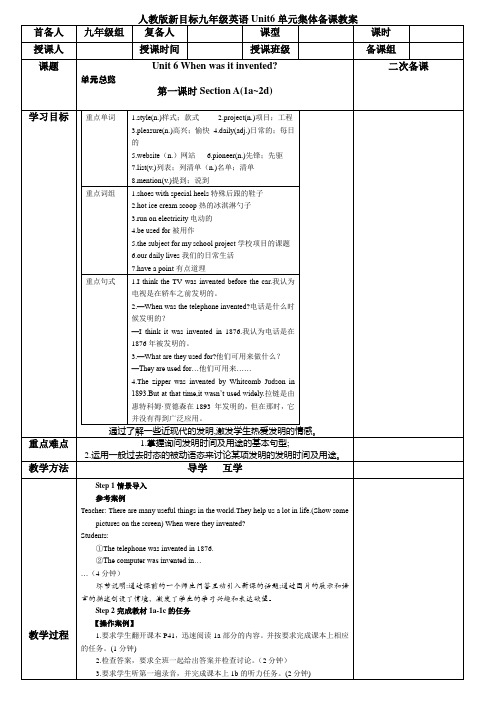
【操作案例】
1.要求学生翻开课本P41,迅速阅读1a部分的内容。并按要求完成课本上相应的任务。(1分钟)
2.检查答案,要求全班一起给出答案并检查讨论。(2分钟)
3.要求学生听第一遍录音,并完成课本上1b的听力任务。(2分钟)
4.要求学生听第二遍录音,并逐句进行跟读。(2分钟)
5.smell(n.)气味(v.)发出……气味;闻到
6.national(adj.)国家的;民族的
7.doubt(n.)疑惑;疑问(v.)怀疑
重点词组
1.by accident偶然,意外地
2.a Chinese ruler called Shen Nong一位叫神农的中国统治者
3.over the open fire在火堆上
Last week,Roy saw awebsite,it says the zipper is one of thegreatestsmall inventions thatchangedthe world.Itmentionedthat the zipper wasinventedby Whitcomb Judson in 1893.But at that time,it wasn’t usedwidely.Paul think he seems to have apoint.The zipper is reallysucha great invention and it’s used in ourdailylives very often andeverywhere.
______________________________________
环节说明:通过带着问题去学习短文,从而达到导入新课的目的,同时也可以使学生积极阅读短文,以了解更多的关于茶的知识。
新目标英语九年级上册Unit 6 Section A1 (1a-2d) 优学案(含答案)
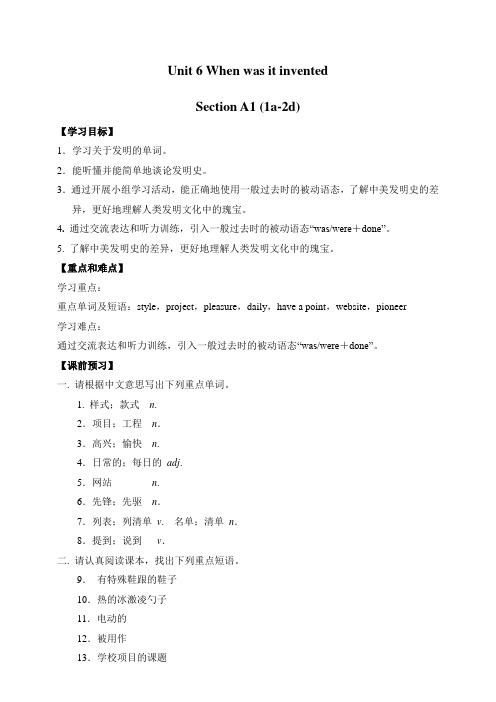
Unit 6 When was it inventedSection A1 (1a-2d)【学习目标】1.学习关于发明的单词。
2.能听懂并能简单地谈论发明史。
3.通过开展小组学习活动,能正确地使用一般过去时的被动语态,了解中美发明史的差异,更好地理解人类发明文化中的瑰宝。
4. 通过交流表达和听力训练,引入一般过去时的被动语态“was/were+done”。
5. 了解中美发明史的差异,更好地理解人类发明文化中的瑰宝。
【重点和难点】学习重点:重点单词及短语:style,project,pleasure,daily,have a point,website,pioneer学习难点:通过交流表达和听力训练,引入一般过去时的被动语态“was/were+done”。
【课前预习】一. 请根据中文意思写出下列重点单词。
1. 样式;款式n._____2.项目;工程n._____3.高兴;愉快n. _____4.日常的;每日的adj. _____5.网站n. _____6.先锋;先驱n._____7.列表;列清单v.名单;清单n._____8.提到;说到v._____二. 请认真阅读课本,找出下列重点短语。
9.有特殊鞋跟的鞋子___________10.热的冰激凌勺子___________11.电动的___________12.被用作_____13.学校项目的课题_____14.我们的日常生活_____15.有道理_____三. 请用以上重点短语完成下列句子。
16.它们是用来做什么的?What are they_____ _____ ?17.我认为电视机是在汽车之后被发明的。
I think the TV _____ _____ _____ the car.【合作探究】探究一、浏览1a, 1b中的图片,参考发明时间和发明家试着完成表格。
Time: 1876, 1885, 1927, 1971, Inventors: Carl Bens, Alexander Bell, J. L. Baird, John V on Neumann探究二、仔细阅读下列短语,在书中标记。
新编实用英语综合教程2课后答案(1~6 unit)
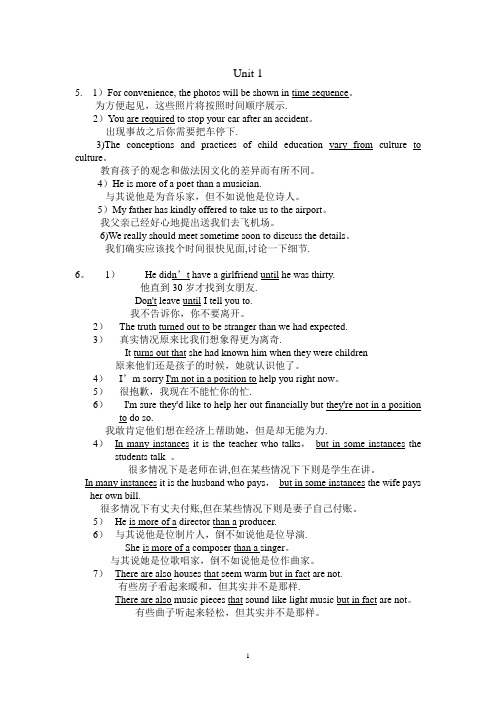
Unit 15. 1)For convenience, the photos will be shown in time sequence。
为方便起见,这些照片将按照时间顺序展示.2)You are required to stop your car after an accident。
出现事故之后你需要把车停下.3)The conceptions and practices of child education vary from culture to culture。
教育孩子的观念和做法因文化的差异而有所不同。
4)He is more of a poet than a musician.与其说他是为音乐家,但不如说他是位诗人。
5)My father has kindly offered to take us to the airport。
我父亲已经好心地提出送我们去飞机场。
6)We really should meet sometime soon to discuss the details。
我们确实应该找个时间很快见面,讨论一下细节.6。
1)He didn’t have a girlfriend until he was thirty.他直到30岁才找到女朋友.Don't leave until I tell you to.我不告诉你,你不要离开。
2)The truth turned out to be stranger than we had expected.3)真实情况原来比我们想象得更为离奇.It turns out that she had known him when they were children原来他们还是孩子的时候,她就认识他了。
4)I’m sorry I'm not in a position to help you right now。
5)很抱歉,我现在不能忙你的忙.6)I'm sure they'd like to help her out financially but they're not in a position to do so.我敢肯定他们想在经济上帮助她,但是却无能为力.4)In many instances it is the teacher who talks,but in some instances the students talk 。
实用综合教程(第二版)1-Unit_6__课后答案

Text A / ComprehensionA. Choose the best answer according to the text.Key: 1.A 2. B 3. C 4. A 5. BB. Complete the following sentences orally with your partner.1.Key: it was already a heavy burden for his parents to support him2.Key: check the candidates’ references3.Key: the time slot was ideal; the restaurant wasn’t very far from his college4.Key: Sir, I will do my best. I’m from the countryside and I’m good at hard work. And I can work two days for free as a trial5.Key: excited and thankful.C. Make a dialogue with your partner according to the situation described below.W: Hello…B: You are too late.W: But sir, I’ll do my best. I’m from the countryside and I’m good at hard work. And I can work two days for free as a trial .B: I want a boy who not only works hard but also keeps clean . Remember it is a restaurant. But look at your hands and clothes !W: Yes, I’m not very clean now. But you know, I have been hunting for a job for a whole day . B: Really? It is difficult to look for jobs nowadays.W: Oh, sir, I’ll keep myself clean and tidy . I promise I will work very hard, sir, if only you could give me this chance .B: All right, all right, I’ll give you a try .W: Thank you, sir!B: Leave me your telephone number and references . I need to have more personal information about you.W: Oh, no problem. Here is my resume .B: That’s good. Let’s see. You may come to work here the day after tomorrow .W: All right! I will be here on time .B: OK, you can go now.W: Thanks again. See you the day after tomorrow .Vocabulary Building / ExercisesA.Match each word with their proper Chinese meaning.B.Fill in each blank with a given word or expression in their rightform.1. The train would pull out soon. We ran like mad to catch it.2. My old grandmother has / had difficulty in remembering things.3. The company employs / employed / has employed about 100 men.4. She checked the letter before sending it.5. We are not prepared to accept the big change in the plan.6. It’s too late to go to the basketball match now;besides , it’s beginningto rain.7. We’ve been hunting for the lost boy all over the town.8. It’s a good habit to go for a walk after supper.Grammar Tips / ExercisesA. Complete each sentence with the given verb in its indefinite tense.1. Tom plays (play) football with his friends after school.2. They read (read) stories every night before going to bed.3. The classroom has (have) eight big windows.4. Did you visit (visit) your relatives last Spring Festival?5. —Did he fly (fly) a kite on Sunday? — Yes, he did .6. We went (go) strawberry picking in the spring break.7. You will feel (feel) cold without an overcoat.8. Her father is going to buy (buy) her a dress for her birthday.9. You are to finish (finish) all the work by the end of today.10. I will give (give) it to you as soon as he comes back.B. Choose the best answer.1. Where does your pen pal live?A. No, she live in the country.B. She live in the city.C. She lives in the city.D. She isn’t live near.2. When does she go to work?A. She go to work at 7.B. She goes to work at 7.C. Yes, she does.D. She is goes at 7.3. Does Peter go to school by subway?A. No, he does.B. No, he doesn’t.C. Yes, on foot.D. Yes, he is.4. — Your city looks beautiful!— Yes. Lots of trees and grass ________ last year.A. are plantedB. have plantedC. were plantingD. were planted5. The PLA ________ in 1927.A. was foundB. foundC. was foundedD. founded6. — Did you win the basketball game?— Bad luck. Our team ________ in the final round.A. wonB. beatC. were wonD. were beaten7. — What did you do last Saturday?— I ________ my uncle.A. visitB. will visitC. visitedD. am visiting8. —Let’s go out to play football, shall we?— OK. I ________.A. will comingB. be going to comeC. comeD. am coming9. It ________ us a long time to learn English well.A. takesB. costsC. spendsD. will spend10. The train ________ at 11.A. going to arriveB. will be arriveC. is going toD. is arrivingC. Complete the sentences according to the Chinese.1. 父亲和孩子们每周日下午都去游泳。
+Unit+2拓展阅读教学设计+-2024-2025学年人教版(2024)七年级英语上册

课时教学设计首页课题U2 Reading Plus 课型新授课(阅读)课时 6主备人审核人语篇研读【What】在本课语篇中,作者以Family Ties in Names为题,介绍了英国名字的组成形式以及名字所体现的家庭纽带。
【Why】通过介绍英国名字相关知识,丰富了本单元的主题内容,助力了单元主题意义探究,帮助学生积累有关英语国家的文化背景知识,尝试进行跨文化对比,从而培养其跨文化交际意识。
【How】本课语篇属于说明文,通过由分到总的文本结构,分别介绍了作者Alan和他的祖父、爸爸、妈妈的名字组成及原因,遵循了逻辑性原则,运用了My full name is..., ... is my middle/last name等基本句式,同时呈现the same as, show great respect to, change... to..., allow... to do, live on等表达方式供学生学习积累,拓展词汇量。
学情分析K (Know) —已知W (Wonder) —想知L (Learned) —已学学生对自己的中文姓名比较熟悉,了解姓名通常包含姓和名两部分,部分学生可能知道一些关于家族姓氏传承的知识;学生已经学习了一些简单的英语词汇和表达,如家庭成员的称呼、常见英文姓名等,具备一定的英语基础。
学生想了解不同国家的姓名特点和文化内涵,尤其是英语国家的姓名与家庭纽带之间的关系;对于如何用英语表达自己和家人的姓名,以及介绍姓名背后的故事充满好奇;希望掌握更多的英语词汇和句型,提高英语阅读能力。
了解了英语国家姓名的构成和文化意义;学会用英语介绍自己和家人的姓名,以及分享姓名背后的故事,提高了英语口语表达能力;掌握了一些新的英语词汇和句型,丰富了英语语言知识;在阅读过程中,学会了运用阅读技巧,如扫读、略读、精读等,提高了英语阅读能力和理解能力。
学习重点难点重点:获取、梳理、概括文章信息;分析文章语言特征;探究主题意义。
Unit6 Section A 3 (Grammar Focus-4c)教案

SectionA3(GrilmnWrFocus-4c)一、教学目标:1 .语盲学问目标:1)学习驾驭1'列词汇:卜idge.low.somebody,translate,lock.ring,earthquake,sudden,allofasudden,bell,biscuit,cookie,musical,inslruιnunl2)进行一步宠习巩固学习SCCliQnA部分所学的生词和词组∙3)迸一步学习运用一般过去时态的被动语态。
4)驾驭主动语态变被动语态的方法,并通过不同方式的练习,来婀熟运用。
2 .情,看法价值观目标,培丙患软力,撩长视察事物,面对雄区.用主动的看法去解决,发挥物象力,相识世界,改造世界。
二、教学t点1 .教学重点,I)学习生词fridge,low,somebody,translate,lock,earthquake,sudden,allofasudden,biscuit,cookie,instrun⅜cnt2)复习巩固SeCliOnA部分所学的生词和词扭,达到斓熟运用的目的。
2 .教学难点,1)一般过去时态的句子变为被动语态.2)综合运用所学的学问进行练习运用。
三、教学过程I・Warming-upandrevision1. Haveadictationofthenewwordslearnedinthelastclass.2. Reviewsomemainphraseswelearnedinthelastclass.CheekIbchome,work.3. 1.elsomesιudeι11s(ellsomethingabouthowteawasinventedbyaccident.Tellsυmelhi ngabouthowleawasinventedbyu<xidcni.OnedayShcnNongwasboilingdrinkingwateroveranOPenfire.Someleavesfromateaplantfellintothewaterandremain edthereforsometime.hproducedanicesmellsohelastedthebrownwater.Icwasquitedeliciousandoneoftheworld'sfavoritedrinkwasinvented.Tellsomethingabout1.uYuandhis ChaJi11fζ.1.uYu"thesaintoftea"mentionedShcnNonginhisbook ChaJing.Thehookdescribeshowteaplantsweregrownaικlused (omaketea.Iialsodiscusseswhere(hefinesttealeaveswereρ11>dυcedandwhatkindsofwalerwereused.ItisbelievedthatteawasbroughttoKoreaandJapanduring6thand7thcenturies.InEngland,teadidn'tappearuntilaround 1660.TheteatradefromChinatoWesterncountriestookplaceinthe19thceι11wy.11,GrammarEocus.I.学生例读GmmmarFoBS中的句子,然后做填空练习。
初中九年级unit6学习教案
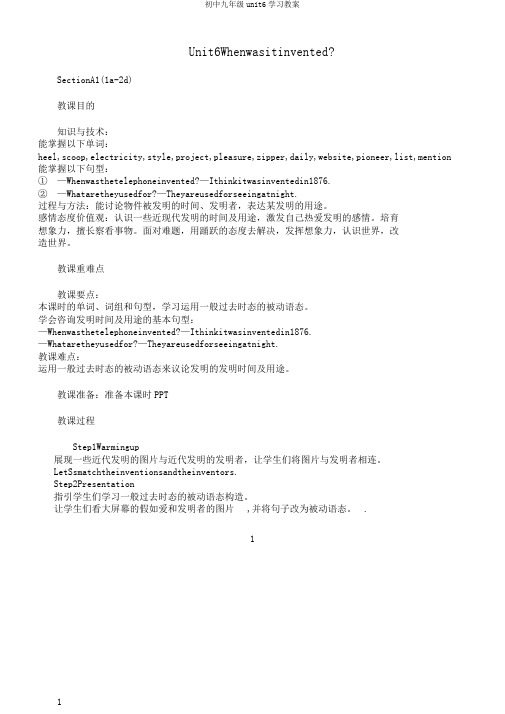
Unit6Whenwasitinvented?SectionA1(1a-2d)教课目的知识与技术:能掌握以下单词:heel,scoop,electricity,style,project,pleasure,zipper,daily,website,pioneer,list,mention 能掌握以下句型:①—Whenwasthetelephoneinvented?—Ithinkitwasinventedin1876.②—Whataretheyusedfor?—Theyareusedforseeingatnight.过程与方法:能讨论物件被发明的时间、发明者,表达某发明的用途。
感情态度价值观:认识一些近现代发明的时间及用途,激发自己热爱发明的感情。
培育想象力,擅长察看事物。
面对难题,用踊跃的态度去解决,发挥想象力,认识世界,改造世界。
教课重难点教课要点:本课时的单词、词组和句型,学习运用一般过去时态的被动语态。
学会咨询发明时间及用途的基本句型:—Whenwasthetelephoneinvented?—Ithinkitwasinventedin1876. —Whataretheyusedfor?—Theyareusedforseeingatnight.教课难点:运用一般过去时态的被动语态来议论发明的发明时间及用途。
教课准备:准备本课时PPT教课过程Step1Warmingup展现一些近代发明的图片与近代发明的发明者,让学生们将图片与发明者相连。
LetSsmatchtheinventionsandtheinventors.Step2Presentation指引学生们学习一般过去时态的被动语态构造。
让学生们看大屏幕的假如爱和发明者的图片,并将句子改为被动语态。
.1Step3TalkingLookatthepicturesin1a.Discusswithyourgroup,inwhatorderdoyouthinktheywereinvented?Tryto numberthem[1-4].Ssdiscusswiththeirpartnersandnumberthepictures.Talkingabouttheinventions:Step4Listening(1b)T:TellSslookatthepicturesandyearsontheleft.PlaytherecordingfortheSstolisten. Sslistentotheconversationandtrytomatchtheinventionwiththeproperyear. Playtherecordingagain.Checktheanswers.Step5Pairwork(1c)Sstrytoremembertheinventionandtheyear.StudentB,coverthedates.StudentA,askStudentBwhenthethingsinthepicturein1bwereinvented.T henchangerolesandpracticeagain.Letsomepairsaskandanswerinpairs.Step6Learningthenewwords&ListeningLookatthepicturesthenlearnthenewwords.Workon2a:Workon2b:LetSsreadthechartbelow.ExplainsomemainsentencesfortheSs.Makesuretheyknowwhattodo. PlaytherecordingfortheSstofillintheblanks.Playtherecordingagaintochecktheanswers.Listenagainandfillintheblanks.Step7 Pairwork(2c)TellSstomakeconversationsusingtheinformationin2b.MakeamodelfortheSs. LetsomeSsmakeconversationsusingtheinformationin2b.Seewhichgroupdoesthebest.Step8Role-play(2d)1.ReadtheconversationsandLetSsreadaftertheteacher.2Explainsomenewwordsandmainpointsintheconversation.AskSstorole-playtheconversationingroups.Step9Languagepoints1.Well,youdoseemtohaveapointhaveapoint有道理2.Theyareusedforseeinginthedark.beusedfordoingsth表.示“被用来做某事”。
人教版新目标九年级英语Unit6单元集体备课教案
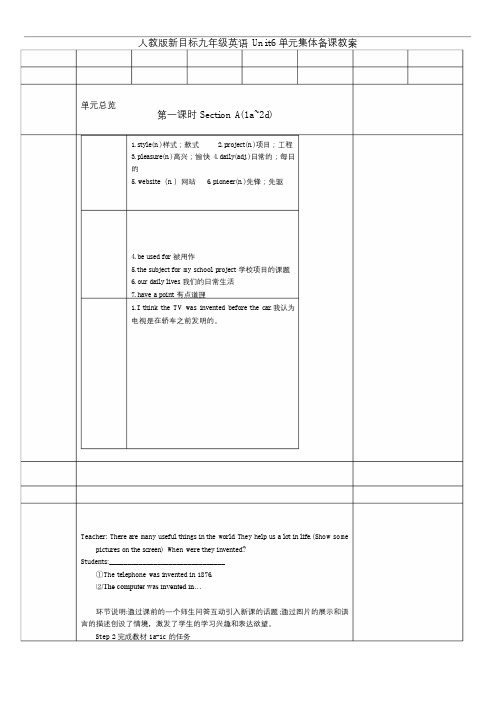
4)A picture was put (put) on the blackboard before class.
5)Platesanddishesweren’twashed(notwash)aftersupper
yesterday.
第四课时Section B(1a~1e)
力,还巩固了学生对目标语言的学习、识记和运用。
第三课时Section A(Grammar Focus~4c)
1.fridge(n.)冰箱
7.sudden(adj.)突然(的)
8.biscuit(n.)饼干
9.cookie(n.)曲奇饼
2.take these photos拍这些照片
4.translate the book into different language把书翻译成不同种的语言
3.要求学生听第一遍录音,并完成课本上1b的听力任务。(2分钟)
4.要求学生听第二遍录音,并逐句进行跟读。(2分钟)
5.完成教材1c的任务,要求学生模仿1a内容,进行对话练习。并邀请2-3对
同学当堂进行演示。(3分钟)
6.小结训练。要求学生在规定的时间内完成一个小练习。并请若干学生给出自
己的答案。有错误的话及时纠正。(2分钟)
5.all of a sudden突然;猛地
6.work on从事,进行
通过了解世界上一些对人类有着重大意义的发明的相关信息,开阔
学生眼界,让学生养成勤于思考,善于发现的好习惯,并培养其创造精神。
1.掌握本课时的重点单词和短语;
本课时的主要内容是谈论发明对我们生活的影响,有好的也
Questions:
4.be used for被用作
PEP小学英语三年级上册Unit6A.Let-'slearnNumbers教案教学实录及评课稿

PEP小学英语三年级上册Unit6A.Let\’slearnNumbers教案教学实录及评课稿(1) 语言知识目标:学生已有的对数字的认知水平为 one—five;本节课在此基础上继续学习数字 six—ten. 要求学生能听说认读数字 1-10;能听懂 Let’s do 里的指示语,并能按照指令做出相应的动作;(2) 能力目标:拓展学生对数字的应用,感受数字在生活中存在的广泛性与重要性;通过一系列任务活动,培养学生主动思维、大胆实践、自主探究的学习能力;(3) 情感目标:结合实际生活,创设真实情境,引导学生关注生活,激发学习兴趣和热情,提高学习的积极性和主动性;培养学生团结合作的意识和精神。
(4) 策略目标:鼓励学生积极运用多种学习方法和策略,自主获取信息,主动交际,分享交流;延伸数字教学,透过数字找规律,拓展渗透数字 10—100,让充分运用所学知识与技能,以建构新的语言知识。
3.教学重难点分析本课时的教学内容为数字 1—10 的教学。
由于学生在平时学习、作业中已不断接触并熟练掌握了数字 1—5,因此在进行教学设计时,充分考虑到学生这一实际认知水平,对教学做了简单调整,通过游戏,快速回顾了数字 1—5,并自然过渡到数字 6—10 的教学。
(1) 教学重点:数字 6,7,8,9,10 的认读;(2) 教学难点:如何结合实际生活,创设大量真实、生动的语言环境,拓展学生对数字的应用,让学生感受到数字在生活中广泛存在,并发挥着重要作用。
能否让学生学以致用是本课教学成败的关键。
4. 教学方法:情境探究法;任务探究法;讨论法;5. 教具准备:自制多媒体课件、图片、单词卡片、实物二、教学过程Step 1: Warm-up1. Ps sing an English song.2. Free talk between teacher and pupils.Step 2: Revision直接引出课题:Numbers请学生说说自己所知道的数字:1,2,...(复习数字 1—5,边呈现相关数字图片。
Unit-6-When-was-it-invented-教案

Unit 6When was it invented?Section A1(1a-2d)一、教学目标:1. 语言知识目标:1)能掌握以下单词:heel, scoop,electricity, style,project, pleasure, zipper, daily, website,pioneer, list,mention能掌握以下句型:①—When was thetelephone invented?—I think it was invented in1876.②—What are they used for?—They are used for seeing at night.2)能谈论物品被发明的时间、发明者,表达某发明的用途。
2.情感态度价值观目标:了解一些近现代发明的时间及用途,激发自己热爱发明的情感。
培养想象力,善于观察事物。
面对难题,用积极的态度去解决,发挥想象力,认识世界,改造世界。
二、教学重难点1. 教学重点:1) 本课时的单词、词组和句型,学习运用一般过去时态的被动语态。
2)学会询问发明时间及用途的基本句型:—When was the telephone invented?—I think it wasinventedin1876.—What are they used for?—Theyareused for seeing at night.2. 教学难点:运用一般过去时态的被动语态来讨论发明的发明时间及用途。
三、教学过程I. Warmingup1.展示一些近代发明的图片与近代发明的发明者,让学生们将图片与发明者相连。
T:Doyou know what theseinventions are?S1:It’s a car.S2:It’satelephone.S3:It’s a television.T:Do you know whothese inventors are?S1: Karl BenzS2: Alexander BellS3: J. L.BairdLet Ss matchthe inventions andthe inventors.Ⅱ. Presentation引导学生们学习一般过去时态的被动语态结构。
人教版九年级英语上册Unit 6《When was it invented》导学案及课堂练习含答案

人教版九年级英语上册Unit 6《When was it invented?》导学案及课堂练习含答案第一课时Section A(1a—2d)【学习目标】1.掌握单词:heel, scoop, electricity, style, project, pleasure, zipper, daily, website, pioneer, list, mention2.掌握短语:shoes with special heels , have a point, run on electricity, be used for, with pleasure,3.掌握句型:I think the TV was invented before the car.---When was the telephone invented? ---I think it was invented in 1876.--- What are they used for? ---They are used for changing the style of the shoes.4.掌握语法:一般过去时态的被动用法。
让学生体验大量语言结构和该结构所表达的功能意义,在他们有了一定的感性认识的基础上,引导他们概括语言结构的特点和功能。
【预习与交流】旧知回顾写出下列单词的过去分词。
invent____________ use______________ change _____________drink ___________bring __________produce _____________ sell ___________steal ___________advise__________ take ____________translate ___________eat ___________新知准备根据汉语提示完成单词。
1. I like the color of this coat but I don’t like its________ (款式).2. It’s my great________ (高兴) to have a talk with you.3. The little inventions have helped me a lot in my ________ (日常的)life.4. Julia introduced a good________ (网站)to me to learn English.5. My mother always________(列清单)all things that she wants to buy before shopping.【自学与合作】According to 2d, fill in the blanks with the right words.Last week, Roy saw a________, it says the zipper is one of the________ small inventions that________ the world. It ________that the zipper was ________by Whitcomb Judson in 1893. but at that time, it wasn’t ________used. Paul thinks he seems to have a ________. The zipper is really________ a great invention and it’s used in our ________lives very often .文化背景知识美国人怎样表达他们对爱迪生的敬意托马斯·阿尔瓦·爱迪生获得的发明专利,超过了任何一位美国人。
- 1、下载文档前请自行甄别文档内容的完整性,平台不提供额外的编辑、内容补充、找答案等附加服务。
- 2、"仅部分预览"的文档,不可在线预览部分如存在完整性等问题,可反馈申请退款(可完整预览的文档不适用该条件!)。
- 3、如文档侵犯您的权益,请联系客服反馈,我们会尽快为您处理(人工客服工作时间:9:00-18:30)。
Unit 6一、授课时间:第13—14周二.授课类型:课文分析10课时;习题讲解2课时三.授课题目:The Telephone四.授课时数:12五.教学目的和要求:通过讲授课文使学生了解作者以一个儿童的眼光和心理,通过大量事实描述了这一现代通讯工具给一个地处黎巴嫩山区小村庄的生活方式带来的影响,学会用英语解释句子以达到学以致用的目的。
要求学生主动地预习课文,课前准备练习,学会分析文章体裁和进行段落划分。
六.教学重点和难点:1)背景知识的传授:Chickenpox; Whooping Cough; Communion2)文章的体裁分析及段落划分;3)语言点的理解:Word study: amid; bustling; chime; congregate; crank; curse; deli; desolate; devout; divine; drill; escalate; shun; wriggle; wringGrammar Focus: the patterns of concessive clauses七.教学基本容和纲要Part One Warm – up1.1 Warm-up Questions1. How would you sum up this piece of writing in one sentence? What is it about?2. Why do you think the author gives the title “The Telephone”? What is the significance of the telephone in this narration?3. What was the author’s village like originally? What specific aspects did the author touch upon to give a vivid picture of this traditional society?Part Two Background Information2.1 Author2.2 Kacula, Seffen-ub, and BebsiPart Three Text Appreciation3.1 Text Analysis3.1.1 Theme of the text3.1.2 Structure of the text3.2 Writing Devices3.2.1 contrast3.2.2 metaphor3.2.3 parallelism3.2.4 paradox3.3 Sentence ParaphrasePart Four Language Study4.1 Phrases and Expressions4.1.1 Word list:4.1.2 Phrases and expressions list:4.1.3 Word Building4.2 Grammar4.2.1 ObjectPart Five Extension5.1 Group discussion5.2 Debating八、教学方法和措施本单元将运用黑板、粉笔、多媒体网络辅助教学设备等教学手段,主要采用以学生为主体、教师为主导的任务型、合作型等教学模式,具体运用教师讲授法、师生讨论、生生讨论等方法进行教学。
九.作业,讨论题,思考题完成课后练习;多看英语报刊杂志及英语经典小说,扩大阅读量;精听与泛听相结合,逐步提高自己的听力水平;积极参加英语角等有助于提高英语口语的活动;坚持用英语写日记;做一些专四相关练习;十.参考资料:1)立编,《现代大学英语精读》(4)第二版,学生用书。
:外语教学与研究,2012。
2)立编,《现代大学英语精读》(4)第二版,教师用书。
:外语教学与研究,2012。
3)观仪主编,《新编英语教程》(第三、四册)。
:外语教学研究出版, 1999。
4)黄源深,虞美等主编,《综合英语教程》(1-4册)。
:高等教育,1998。
5)《高等学校英语专业英语教学大纲》,:外语教学研究,2000。
6)Judy Pearsall主编,《新牛津英语词典》。
:外语教育,1998。
7)丁往道、吴冰等编著,《英语写作手册》。
:外语教学与研究。
8)道真,《现代英语用法词典》(重排本)。
:外语教学与研究,1994。
9)道真,温志达, 《英语语法大全》上、下卷。
:外语教学与研究,1998。
十一、课后小结Unit 6 The TelephonePart One Warm – up1.1 Warm-up Questions1. How does the installation of the telephone change the village and the life of all the villagers? Are the changes positive? Does it make everybody happy in the village?2. Why do you think the author chooses to use the first person in the narration and gives thisnarration from a child’s point of view? Is he writing this piece for children? Is he writing in a humorous vein because he has no other purpose than amusing readers?3. How do you like this text? Any comments? Any criticisms? This kind of traditional society is dead and gone. Why do these writers keep trying to take us to the past? Does it serve any useful purpose apart from satisfying our idle curiosity?Part Two Background Information2.1 AuthorAnwar F. Accawi was born in Lebanon in a family whose ancestors are believed to have gone to Jerusalem in the “Crusades.”While he was teaching English at the University of Beirut, he married an American from Tennessee. When the civil war broke out in Lebanon, they were forced to leave the country and settle in the United States. Anwar F. Accawi became a teacher of English at the University of Tennessee, Knoxville.2.2 CommunionIt refers to the religious ceremony in which believers eat bread and drink wine as symbols of Christ’s body and blood to remember the Last Supper of Jesus Christ.Part Three Text Appreciation3.1 Text Analysis3.1.1 Theme of the text1) The text describes, from a boy’s perspect ive, how the telephone affec ted people’s way of life ina Lebanese mountain village: It broke the seclusion of the village.2) The text raised us a question: what attitude we should adopt toward new things, whether we should welcome them or boycott them.Plot: The coming of telephone brought some changes into a small village, both personally and socially.Setting: social setting: in the early 20th century before the process of modernization story setting: in the village in LebanonProtagonist: “I”—when the author was young3.1.2 Structure of the textI. Life in the village before it had a telephone (paras. 1-10)A. How the village kept track of time in the past (paras. 1-8)B. What happened in the year of the drought (paras. 9-10)II. The installation of the first telephone in the village (paras. 11-18)A.How the villagers came to decide to have a telephone (para. 11)B.What sensation and curiosity the installation created (paras. 12-18)III. Effects of the telephone on the life of the villagers (paras. 19-25)A.How the village center shifted (paras. 19-22)B.How and why a lot of people left the village (paras. 23-25)Relevant questions:Q1: What was the overall picture of the this village before the telephone arrived? What specificdetails did the narrator give to present thispicture?A:from its geographical location; (Para. 1)from the detailed description; (Paras. 1—3)from the carefully-chosen wordsQ2: What do you make of the fact that the people in the village had no calendar and clock and had no need for them? What kind of society is it that does not need so much to keep track of the hours, days, months, and years?A: Not industrialized countryside. Everything is slow and there is no need to hurry.Q3: What can we infer from the fact that the roof of the mayor’s house caved in under the heavy snow?A: Snow was usually heavy. It was a good sign of heavy snow.Q4: How did the people there keep track of the important events in their lives?A: The important events were always remembered with time marked by the mentioning of earthquakes, droughts, floods, locusts, and pestilencesQ5: What interesting things happened the year of the drought which the narrator remembered so vividly as a boy?A: Arguments escalated into full-blown, knockdown-drought fights for water.Q: What impression did you get about the life in the small village according to the text?A: The very traditional countryside society.Q: Retell the normal life in the small village.Q1: Why did the narrator say that it was one of the worst years for him? What happened?A: Magdaluna decided to install its own telephone.Q2: Why does the author introduce the subject of the telephone so late in the article?Does it indicate poor organization and lack of coherence on the part of the author?Q3: Why did the narrator think the telephone installment was a big event?Well-chosen words to describe people’s reaction to the telephone installment.Q4: Where had the village center been in the past?A: The home of Im KaleemHer appearance: short, middle-aged, black-haired, with a loud unpleasant voiceHer character: generous, understanding, sensibleHer role: confessor, good listener, pressure-reliever and troubleshooterQ5: Where was it now?A. At Abu Raja’s h ome where the telephone was installed.Why? no longer contented with their way of life; hungry for news from the outside worldQ6: What changes happened to the narrator as a boy? Why?The coming of the telephone ended his role as the message boy.Q7: What other changes took place in the village?Many people were leaving the village for big cities or foreign countries to find jobs and better life. Result: the village reduced to a skeleton of its former self.Q: What was the narrator’s feeling toward the ch anges?1. From the point of view of language and style, this story deserves our close attention particularly on the following points:a. The author’s careful and clever choice of examples for bringing out his key ideasb. The clever way of hiding significant messages in a seemingly childish narrationc. The clever humorous touchesd. The skillful uses of figures of speeche. The clever use of words that give a strong local colorf. The skillful way of repeating words and sentence patterns to achieve the effect of describing a traditional society and life where things happen without any change3.2 Writing Devices3.2.1 Typical Narrative Techniquesthe use of figure of speech with a local flavor (The most striking narrative technique in the essay )We knew what to do and when to do it, just as the Iraqi geese knew when to fly north, driven by the hot wind that blew in from the desert. (Para. 1)… the two important-looking men from the telephone company, who proceeded with utmost gravity, like priests at communion, to wire up the telephone. (Para. 13)I wriggled my way through the dense forest of legs to get a firsthand look at the action. (Para. 1) Her house was an island of comfort, an oasis for the weary village men, exhausted from having so little to do. (Para. 1)… they were ready to toss back and forth, like a ball, the latest rumors going around the village. (Para.1)Magdaluna became a skeleton of its former self, desolate and forsaken, like the tombs, a place to get away from. (Para. 1)3.2.2 paradoxa situation or statement that seems strange or impossible because it contains two ideas that are both trueExamples:He was shocked by the poverty in the midst of affluence.She was a devout Catholic and also the village whore.He is vain about not being vain.Her house was an oasis for the weary village men, exhausted from having so little to do.All mothers know that they sometimes have to be cruel to be kind.The more we possess, the more we are possessed.No belief is in itself a belief.3.3 Sentence Paraphrase1. … time didn’t mean much to anybody, except maybe to those who were dying.The villagers didn’t think time was important until perhaps when they were dying.2. In those days, there was no real need for a calendar or a watch to keep track of the hours, days, months, and years.keep track of: to keep oneself informed about a person, situation, etc.cf. lose track of: to fail to remain informedExamples:They try hard to keep track of their favorite stars.He loses track of time whenever he surfs the Net.3.Para. 2But ours was a natural or, rather, a divine-calendar, because it was framed by acts of God: earthquakes and droughts and floods and locusts and pestilences.… We used natural disaster s to keep track of time and of the important events in our lives. This was a natural calendar though it is more accurate to say a divine calendar, for sunrise and sunset, the change of seasons, and earthquakes and droughts and floods and locusts and pestilences were all works of God.4.Para. 4… that caused the roof on the mayor’s house to cave in.(of roof or wall) to fall down or inward; to collapse… that caused the mayor’s house roof to collapse.5. Para. 7You couldn’t be more accurate than that, now, could you?(spoken) used for giving emphasis to a request, order, or commentBe careful, now. (order)Now, what’s going on here? (request)It’s marvelous, now isn’t it? (comment)6.Para. 8And that’s the way it was in our little village for as far back as anybody could remember. And that’s how we kept track of the important events in our little village to the extent that/ for as long as the oldest people could remember.7. … because men who would not lie even to save their own souls told and retold that story until it was incorporated into Magdaluna’s calendar.to save their lives; … until the event became one of the things by which we kept track of the important events in our lives.This shows, to some extent, the way of thinking of the villagers in those days when honesty prevailed. They trusted honest people and didn’t seek any proof for what had been said about past events.incorporate sth. (into): to add or include sth. as part of sth. elseExamples:The company decided to incorporate the new feature into their microcomputer.A number of courses in public relations have been incorporated into our curriculum.8. There was, for instance, the year of the drought, when the heavens were shut for months and the spring from which the entire village got its drinking water slowed to a trickle.It didn’t rain for months as if the sky were shut tight; Gradually there was only a small amount of water coming slowly out of the spring.9.to: used for stating what condition or state sb. or sth. is after a changeThe ancient temple has been restored to its former glory.The disease has reduced the patient to a bag of bones.10. Para. 9their napping men and wet babiestheir husbands who were taking a nap and their babies who were breast fedCultural Note: Men in Arab countries, especially in the countryside, usually don’t do any housework.11. Para. 10 And sometimes the arguments escalated into full-blown, knockdown-dragout fights.in the most complete and developed form; (AmE.) very violent or uncontrolledAnd sometimes the arguments became so fierce that the women began to fight violently.12.Para. 10… call each other names that made my ears tingle…to abuse them by insulting words… the words they used when they were quarreling were so offensive t hat we little boys felt uncomfortable…13. Para. 10 I remember the rush, the excitement, the sun dancing on the dust clouds as a dress ripped and a young white breast was revealed, then quickly hidden.Some women were fighting furiously creating dust clouds. The sun was moving quickly on the dust when a young woman’s dress was torn open and her breast exposed. We little boys would rush to steal a glance before it was hidden again. I still remember the excitement I felt at such moments.14.… Magdaluna was n ot going to get anywhere until it had one.… Magdaluna wouldn’t achieve any success without a telephone.15. to get anywhere/somewhere/nowhere: to make some/no progress or have some/no successHave you got anywhere in your project?You’ll surely get somew here if you persist in it.Losing your temper won’t get you anywhere with them.16. But they were outshouted and ignored and finally shunned by the other villagers…those for the telephone were louder (or stronger) than the others in their argumentsBut th e majority of the villagers were for the telephone, and they wouldn’t listen to those few people who were finally deliberately avoided for resisting progress.17. … when the loud voices of the men talking, laughing, and arguing could be heard in the street below—a reassuring, homey sound.a sound that makes you feel less worried and that is in a pleasant way and reminds you of home18. … the signal that they were ready to toss back and forth, like a ball, the latest rumors going around the village.… this s howed that now they were ready to exchange the latest news.19. The telephone was also bad news for me personally. It took away my lucrative business—a source of much-needed income.used humorously to exaggerate the boy’s disappointment at his lossFor the boy the coming of the telephone deprived him of the opportunity to earn some money. 20. On a good day, I ran nine or ten of those errands, which assured a steady supply of marbles that I usually lost to other boys.to make sth. certain to happenExample:Strength and good tactics assured his success at the Asian Games.When I was lucky, I got nine or ten errands to run a day. With the money I earned I could buy new marbles so that I always had an adequate number to play with, although I usually lost them to other boys.21. Magdaluna became a skeleton of its former self, desolate and forsaken, like the tombs, a place to get away from.With the healthy, the young, and the able-bodied all gone, Magdaluna was not what it had been. The house, the streets and the store were there, but they were no longer alive with laughter and the loud voices of the men talking, laughing, and arguing. It became a much-deserted place, a place to escape from, like a graveyard or cemetery.Part Four Language Study4.1 Phrases and Expressions4.1.1 Word list:1. droppings; fish-bearing; flare; forcefully; forsaken; full-blown; grapple; hailstorm; heel; hide-and-seek; homey; incorporate; jet-black; knockdown4.1.2 Phrases and expressions list:1. terraced fields;2. rocky mountains;3. whooping cough;4. surrounding villages;5. a clearing in the wood;6. fine dust;7. goat droppings;8. sticky hands;9. sinewy women; 10. a forest of flags 11. firsthand information; 12. jet-black hair; 13. a devout Catholic; 14. household chores; 15. a reassuring homey sound; 16. hand-rolled cigarettes; 17. lucrative business; 18. a butcher-shop; 19.a skeleton of its former self; 20. a missionary school4.1.3 Word BuildingJet-black; pitch-dark; pitch-black; crystal-clear; snow-white; sea-green; ice-cold; sky-high; sky-blue4.2 Grammar4.2.1 Learn to use as and though as concessive conjunctions.1. adjective + as/though + sb/sth + link verb2. noun phrase + though + sb/sth + link verb3. Much as + subject + verb4. Try as sb might/could/would4.2.2 Learn to use It is/was (high) time (that) sb did sth1. long past the right time for sth, e.g.It’s high time the children were in bed. The clock has struck midnight.(They should have gone to bed long ago)2. the appropriate time for sth, e.g.Abu Raja, the retired cook, decided it was time Magdaluna got its own telephone. (para. 11) (…it was the right time for the village to have its own telephone)Part Five Extension5.1 Group discussion1. Do you think that people’s natural nostalgia should be encouraged? Wouldn’t it make people look backward and therefore become conservative?2. Can you give examples other than the telephone to show that all important technological andscientific discoveries lead to economic, political, social and cultural changes?3. Are technological inventions always blessings to us human beings?5.2 DebatingTopics for debating:1. Describe the year of the drought the author remembers so fondly.2. Describe how the telephone came to be installed in the village.3. Describe how the village’s social center shifted from Im Kaleem’s home to the dikkan.4. Give a brief character sketch of Im Kaleem.。
